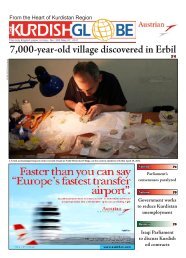Displaced and refugee families in Suleimaniya ... - Kurdish Globe
Displaced and refugee families in Suleimaniya ... - Kurdish Globe
Displaced and refugee families in Suleimaniya ... - Kurdish Globe
Create successful ePaper yourself
Turn your PDF publications into a flip-book with our unique Google optimized e-Paper software.
The <strong>Kurdish</strong> <strong>Globe</strong> No. 314, Saturday, July 23, 2011 14The rise of ethnic politics<strong>and</strong> theories of nationalismBy Salah Bayaziddi sbayaziddi@yahoo.com (Part I)The emergence of new nationstatesof Eritrea, East Timor, Kosovcvo, Monte-Negro, South Sudan <strong>and</strong>more to follow <strong>in</strong> the future shouldbe seen as a new rise of ethnicpolitics around the globe. Today,throughout the world, the spread ofnationalism appears to be the majcjor source of manifest <strong>and</strong> directviolence <strong>in</strong> a so-called post-ColdWar period. There is also causefor concern if, as has been calculclated, most countries <strong>in</strong> the worldare multi-ethnic societies. Giventhe persist<strong>in</strong>g economic crisis <strong>and</strong>uneven economic development <strong>and</strong>acute difficulties many Third Worldcountries face, a further <strong>in</strong>tensificatction of ethnic conflicts seems likely<strong>in</strong> the future. It is also important tonote the effects of nationalism arehighly varied <strong>and</strong> there are dist<strong>in</strong>ctctions among different types of ethncnic nationalism. Specifically, themost important part of the work ofacademic researchers who studythe rise of nationalism <strong>and</strong> its impcportance to global conflicts can befound <strong>in</strong> identify<strong>in</strong>g varieties ofnationalism that are most likely tocause the greater risk of conflict<strong>and</strong> <strong>in</strong>stability <strong>in</strong> the world.Nationalism is usually thoughtof as a primordial historical phencnomenon, the emotional b<strong>in</strong>d<strong>in</strong>gby which a political communityf<strong>in</strong>ds its historical expression <strong>and</strong>maturity. It also is usually taken tobe an essential but pass<strong>in</strong>g stage <strong>in</strong>the march of history, necessary <strong>in</strong>produc<strong>in</strong>g the modern nation, butalso to be left beh<strong>in</strong>d as more ratctional <strong>and</strong> progressive forms of polclitical society take the place of themore backward. Admittedly, thenational idea had almost <strong>in</strong>variablyturned <strong>in</strong>to an aggressive agent ofoppressive political dom<strong>in</strong>ationwhich did not heed the pr<strong>in</strong>ciple oftolerance vis a vis other ethnic m<strong>in</strong>cnorities any more, <strong>and</strong> only soughtto ruthlessly extend its sphere ofcontrol at the expense of others.The idea of nation, so it appeared,had become a force of division <strong>and</strong>strife, both <strong>in</strong> the domestic arena<strong>and</strong> <strong>in</strong> <strong>in</strong>ternational affairs. As apolitical doctr<strong>in</strong>e, nationalism canbe def<strong>in</strong>ed as sentiment <strong>and</strong> ideolocogy of attachment to a nation <strong>and</strong>its <strong>in</strong>terests. Nationalism is a powecerful emotion that has dom<strong>in</strong>atedthe political thought <strong>and</strong> actions ofmost peoples s<strong>in</strong>ce the time of theFrench Revolution. It is not a naturcral, but an historical phenomenon,that has emerged as a response tospecial political, economic <strong>and</strong> soccial conditions. In accordance withsome def<strong>in</strong>itions, nationalism is anactive force <strong>in</strong> history which was tobe found only <strong>in</strong> late 18th centuryWestern Europe <strong>and</strong> North Americawhile others def<strong>in</strong>e nationalism as astate of m<strong>in</strong>d, <strong>in</strong> which the supremeloyalty of the <strong>in</strong>dividual is felt to bedue the nation-state.The ma<strong>in</strong> objective of this reviewis to compare <strong>and</strong> contrast some ofthe key features of three relat<strong>in</strong>gworks of Benedict Anderson <strong>and</strong>Ernest Gellner while highlight<strong>in</strong>gtheir similarities <strong>and</strong> differences.Both authors have made a significcant contribution to the sociology,history <strong>and</strong> theories of nationalismby exam<strong>in</strong><strong>in</strong>g the <strong>in</strong>terrelations betctween the patterns of developmentof different national movement.Anderson def<strong>in</strong>es the nation as“an imag<strong>in</strong>ed political community— <strong>and</strong> imag<strong>in</strong>ed as both <strong>in</strong>herentlylimited <strong>and</strong> sovereign.” (Anderson,1991, p. 15) Such communities,he argues, were made possible bythe convergence of capitalism <strong>and</strong>pr<strong>in</strong>t technology on the fatal diverscsity of human language. In contrast,Gellner considers nationalism to bea dist<strong>in</strong>ctly <strong>in</strong>dustrial pr<strong>in</strong>ciple ofsocial evolution <strong>and</strong> social organcnization. Indeed, nationalism <strong>and</strong>the nation-state provide the sole legcgitimate form of political organizatction with<strong>in</strong> the global trend toward<strong>in</strong>dustrial societies. Gellner viewsnationalism as a consequence ofthe objective need for <strong>in</strong>dustrial ratctionality, while he argues that “havic<strong>in</strong>g a nation is not an <strong>in</strong>herent attctribute of humanity, but it has nowcome to appear as such.” (Gellner,p.6) Anderson is also the author ofLong-Distance Nationalism: WorldCapitalism <strong>and</strong> the Rise of IdentityPolitics whose thesis is that globalcapitalism seems to be producic<strong>in</strong>g a new mutation of nationalism(Anderson, 1991, p. 12). Indeed,the two crucial axes of capitalism(transportation <strong>and</strong> communicatctions) have had extraord<strong>in</strong>ary effcfects on conceptions of nationalidentity.Summary of booksIn an effort to analyze the theoryof nationalism, Anderson, one ofthe expert scholars of modern natctionalism, <strong>in</strong> his book Imag<strong>in</strong>edCommunities, claims that termssuch as “nationality,” “nation-ness”<strong>and</strong> nationalism are cultural artifcfacts of a particular k<strong>in</strong>d — realitiesconstructed by human imag<strong>in</strong>ation.He def<strong>in</strong>es the nation as an imagic<strong>in</strong>ed community because there is noway for all its members to engage<strong>in</strong> face-to-face contact with all fellclow members at all times. So, membcbers can only perceive the nation aswhole by referr<strong>in</strong>g to the image ofit that they have constructed <strong>in</strong> theirown m<strong>in</strong>ds. Anderson also admits,<strong>in</strong> order to underst<strong>and</strong> them (natction, nationality <strong>and</strong> nationalism)properly we need to consider carefcfully how they come <strong>in</strong>to historicalbe<strong>in</strong>g, <strong>in</strong> what ways their mean<strong>in</strong>gshave changed over time, <strong>and</strong> why,today they comm<strong>and</strong> such profoundlegitimacy (Anderson, 1991, pp.13-14). The explanation for suchfar-reach<strong>in</strong>g theory cont<strong>in</strong>ues asfollows. The possibility of imag<strong>in</strong>ic<strong>in</strong>g the nation arises for three ma<strong>in</strong>reasons: First, it is limited becauseeven the largest of them is f<strong>in</strong>ite.Second, it is imag<strong>in</strong>ed as sovereignbecause the concept got recognitionfollow<strong>in</strong>g the age of Enlightenment<strong>and</strong> Revolution were destroy<strong>in</strong>glegitimacy of the div<strong>in</strong>e-order<strong>in</strong>g<strong>and</strong> hierarchical dynastic system.Third, the nation is imag<strong>in</strong>ed as acommunity because regardless ofthe actual <strong>in</strong>equality <strong>and</strong> exploitatction, the nation is always conceivedas a deep image of companion (Andcderson, 1991, pp. 15-16).For Anderson, the nation becamenecessary as some older identitiesbegan to lose their credibility. Threecentral elements of pre-nationalistancient regime were: sacred langcguages <strong>and</strong> scripts (Lat<strong>in</strong>, Arabic,Pail, Ch<strong>in</strong>ese), held to be the solekeys to truth; div<strong>in</strong>e monarchs; <strong>and</strong>an equidistant sense of past time(Anderson, 1991, p. 30). Indeed,nationalism arose <strong>in</strong> the 18th centctury at a time when the ancient veritcties — religion, dynasty <strong>and</strong> cosmolclogical perceptions of time — werebe<strong>in</strong>g rapidly overturned. The onedevelopment most responsible forthe breakup of cultures based onthese ideas was movable type <strong>in</strong> theh<strong>and</strong>s of private enterprise publishecers seek<strong>in</strong>g a mass market for theirwares among people not versed <strong>in</strong>the universal sacred languages. It isimportant to mention that Andersonhas opened up an entirely new fieldof <strong>in</strong>quiry, closer <strong>in</strong> many ways tothe concerns of cultural criticismthan to those of traditional socialscience. Overall, he aims to provethat nationalism is best understoodby situat<strong>in</strong>g it with<strong>in</strong> the context ofculture rather than ideology.Anderson gives pr<strong>in</strong>t-capitalicism greater credit for spurr<strong>in</strong>g theEuropean age of nationalism. Hegives more attention to the <strong>in</strong>itialperiod of capitalist enterprise <strong>and</strong>pr<strong>in</strong>t technology, when <strong>in</strong> an attctempt aims to expla<strong>in</strong> why by the17th century languages <strong>in</strong> Europehad generally assumed their modecern forms. With the advent of pr<strong>in</strong>tlanguages, speakers of membersof the European languages, suchas French, English <strong>and</strong> Spanish,could for the first time imag<strong>in</strong>ethemselves as part of a larger commcmunity. It is because the nation is a“community imag<strong>in</strong>ed through langcguage” that it can so easily th<strong>in</strong>k ofitself as ancient. So, only a nationalicism rooted <strong>in</strong> language, rather thanblood, could allow anyone to be“<strong>in</strong>vited <strong>in</strong>” to the imag<strong>in</strong>ed commcmunity — evident from the fact thatnearly every nation-state acceptsthe pr<strong>in</strong>ciple of naturalization. Andcderson also draws on Hobsbawm<strong>in</strong> expla<strong>in</strong><strong>in</strong>g how pr<strong>in</strong>t-capitalismtransformed shapeless, confus<strong>in</strong>gevents like the French popular uprcris<strong>in</strong>g of 1789 <strong>in</strong>to “French Revolclution,” a model to be studied <strong>and</strong>copied. Essentially, he contendsthat these pr<strong>in</strong>t languages laid thebases for national consciousness<strong>in</strong> three dist<strong>in</strong>ct ways. First, theycreated unified fields for exchange<strong>and</strong> communication. Second, pr<strong>in</strong>tcapitalismprovided a new fixity tolanguage that <strong>in</strong> long run helpedto build that image of antiquity socentral to the objective idea of thenation. Third, pr<strong>in</strong>t-capitalism creacated a language of power of a k<strong>in</strong>ddifferent from the older adm<strong>in</strong>istratctive spoken form (Anderson, 1991,pp. 47-48).In contrast to Anderson, Gellner<strong>in</strong> Nations <strong>and</strong> Nationalism offcfers a full-fledged theory of natctionalism, embedded <strong>in</strong> a theoryof the universal tendency toward<strong>in</strong>dustrialism. Indeed, nationalismcan be seen as an immediate conscsequence of the “objective need”for what Gellner <strong>in</strong>sists on call<strong>in</strong>g“<strong>in</strong>dustrial rationality.” (Gellner,p. 20) For him, nationalism is typiccal of the transition to the rationaltradition <strong>and</strong> at the same time itexpresses the societal thrust towcward homogeneous perception <strong>and</strong>homogeneous social organization<strong>and</strong> behavior. The establishment ofpervasive high cultures (st<strong>and</strong>ardicized, literacy- <strong>and</strong> education-basedsystems of communication) seemsto be the natural repositories of polclitical legitimacy. This po<strong>in</strong>t raisesan <strong>in</strong>terest<strong>in</strong>g notion with regardto Gellner’s characteristic scenarioof the evolution of nationalism <strong>and</strong>ethnic politics with<strong>in</strong> the formerSoviet Union when he contends “<strong>in</strong>the Soviet Union the consumers of‘ethnic’ gramophone records arenot the rema<strong>in</strong><strong>in</strong>g ethnic rural popuculation, but the newly urbanized,educated <strong>and</strong> multil<strong>in</strong>gual populatction, who like to express their realor imag<strong>in</strong>ed sentiments <strong>and</strong> roots<strong>in</strong> as much nationalist behavior asthe political situation may allow.”(Gellner, pp. 57-58) Essentially,Gellner contends that nationalism<strong>and</strong> nation-state provide the solelegitimate shape of political structcture with<strong>in</strong> the global trend toward<strong>in</strong>dustrial societies.Gellner asserts that the mutual relclationship of a modern culture <strong>and</strong>state is someth<strong>in</strong>g quite new <strong>and</strong>an <strong>in</strong>dustrial high culture is no longcger l<strong>in</strong>ked — whatever its history<strong>and</strong> roots to a faith <strong>and</strong> a church.Indeed, the high cultures of the <strong>in</strong>dcdustrial age differ from those of theagrarian order <strong>in</strong> a number of impcportant ways (Gellner, p. 140). Hediscusses the concept of his theory<strong>in</strong> three variables: First, the distributction of political power <strong>in</strong> a society.Second, there is an easy access toa “high culture” of literate <strong>and</strong> sopcphisticated communication througha system of public education versusvertically segmented social groups,each attached to a local “low cultcture.” Third, ethnic homogeneityas opposed to ethnic heterogeneity,as def<strong>in</strong>ed by language (Gellner,pp.140-141). For Gellner, the comb<strong>in</strong>atction <strong>in</strong> which these variables occur<strong>in</strong> any given society will determ<strong>in</strong>ewhat k<strong>in</strong>d of national identification— if any — will prevail. It is cruccial to mention he does not believethat every potential nation becomesa real one because most people dealwith their long<strong>in</strong>gs <strong>and</strong> frustrationsby simply assimilat<strong>in</strong>g with others<strong>in</strong>itially unlike them. Some societicies — mostly agrarian — simplydo not have the means for politicalcentralization which is the state <strong>and</strong><strong>in</strong>corporat<strong>in</strong>g the broad masses ofthe population <strong>in</strong> what Gellner callsa “high culture” (Gellner, p. 35).Gellner also rejects theories ofnationalism that stress the objectctive or the subjective schools ofthought because he has an oppositeview about the evolution of natctionalism through different stagesof human history. That is the coreof his thought. The satisfaction ofthe nationalist pr<strong>in</strong>ciple was not aprecondition of the first appearanceof <strong>in</strong>dustrialism, but only the producuct of its spread. Indeed, mank<strong>in</strong>darrived <strong>in</strong> the <strong>in</strong>dustrial age withcultural <strong>and</strong> political <strong>in</strong>stitutionswhich generally contradicted thenationalist requirement (Gellner, p.40). He hopes to break out of thisdeadlock by argu<strong>in</strong>g from the outscset that nationalism is the generalimposition of a “high culture” onsociety, where previously low cultctures had taken up the lives of themajority, <strong>and</strong> <strong>in</strong> some cases of thetotality, of the population. It meansthat modernization generates thelong<strong>in</strong>gs <strong>and</strong> adjustments that prodcduce nations not the objective ofsocial <strong>and</strong> cultural identity.The idea of world capitalism<strong>and</strong> the rise of identity politics ismade evident <strong>in</strong> Anderson’s article,“Long-Distance Nationalism.” Andcderson who is break<strong>in</strong>g away fromthe historical thoughts of WoodrowWilson that “Europe consisted of ascatter gram of bounded, immobile,‘national communities,’ aroundwhich <strong>in</strong>genious map l<strong>in</strong>es couldbe drown to make possible new, autctonomous, nation-states,” (Anderscson, 1992, p. 6) provides his readecers with a fasc<strong>in</strong>at<strong>in</strong>g idea: Worldcapitalism is produc<strong>in</strong>g new formsof nationalism. The subjective expcperience <strong>and</strong> political significanceof migration, he argues, has beenprofoundly changed by the technolclogical developments (transportatction <strong>and</strong> communications) of capitctalism s<strong>in</strong>ce the end of World WarII. For example, “They can f<strong>in</strong>dways to the relatives on the telepcphone, communicate by fax, sendmoney by telex, <strong>and</strong> receive photos<strong>and</strong> videos, all <strong>in</strong> the tw<strong>in</strong>kl<strong>in</strong>g ofan electronic eye. The mediatedimagery of ‘home’ is always withthem” (Anderson, 1992, p. 8).Anderson, Benedict. Imag<strong>in</strong>ed Commtmunities: Reflections on the Orig<strong>in</strong> <strong>and</strong>spread of Nationalism. London: Verso,1991.Anderson, Benedict. “Long-DistanceNationalism: World Capitalism <strong>and</strong> theRise of Identity Politics.” The WertheimLecture, Centre for Asian Studies Amsterdtdam, 1992. (14pp).Gellner, Ernest. Nations <strong>and</strong> Nationalitism. Ithaca: Cornell University Press,1983.

















